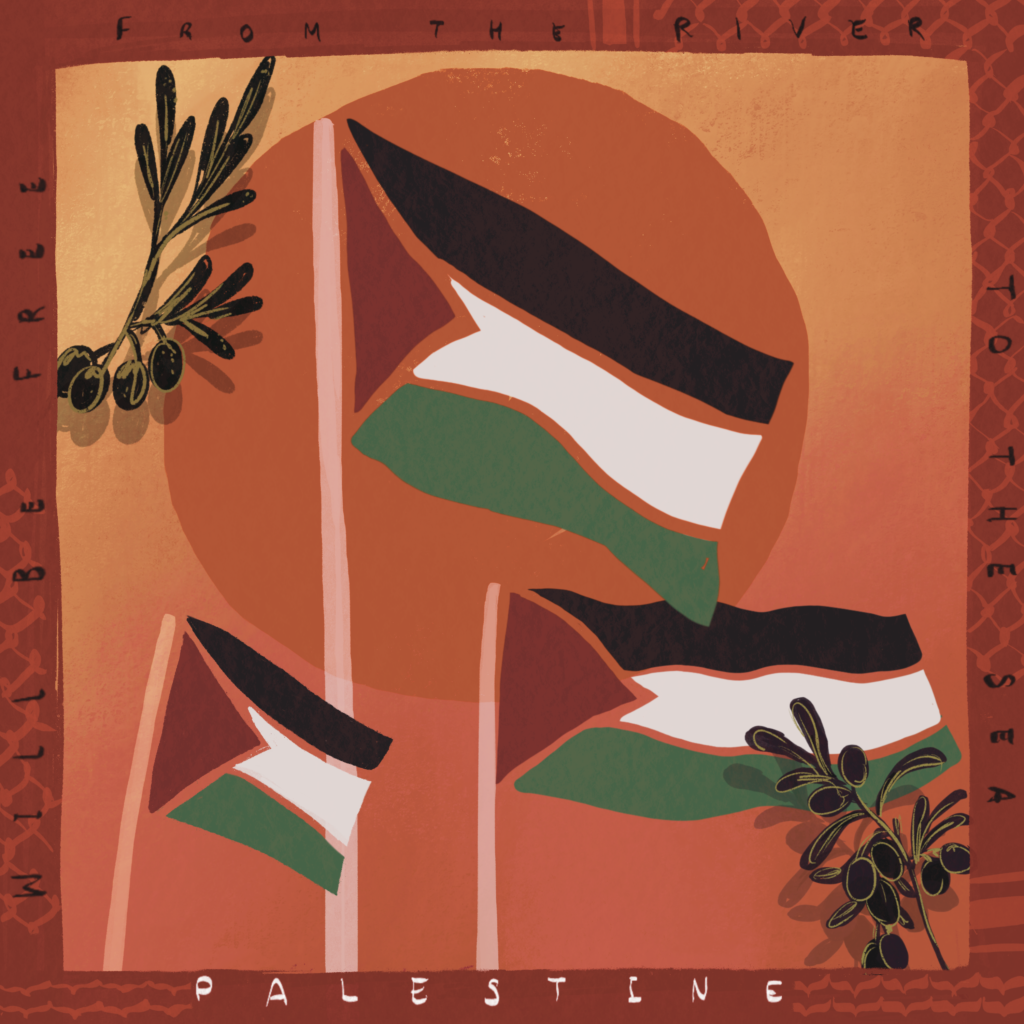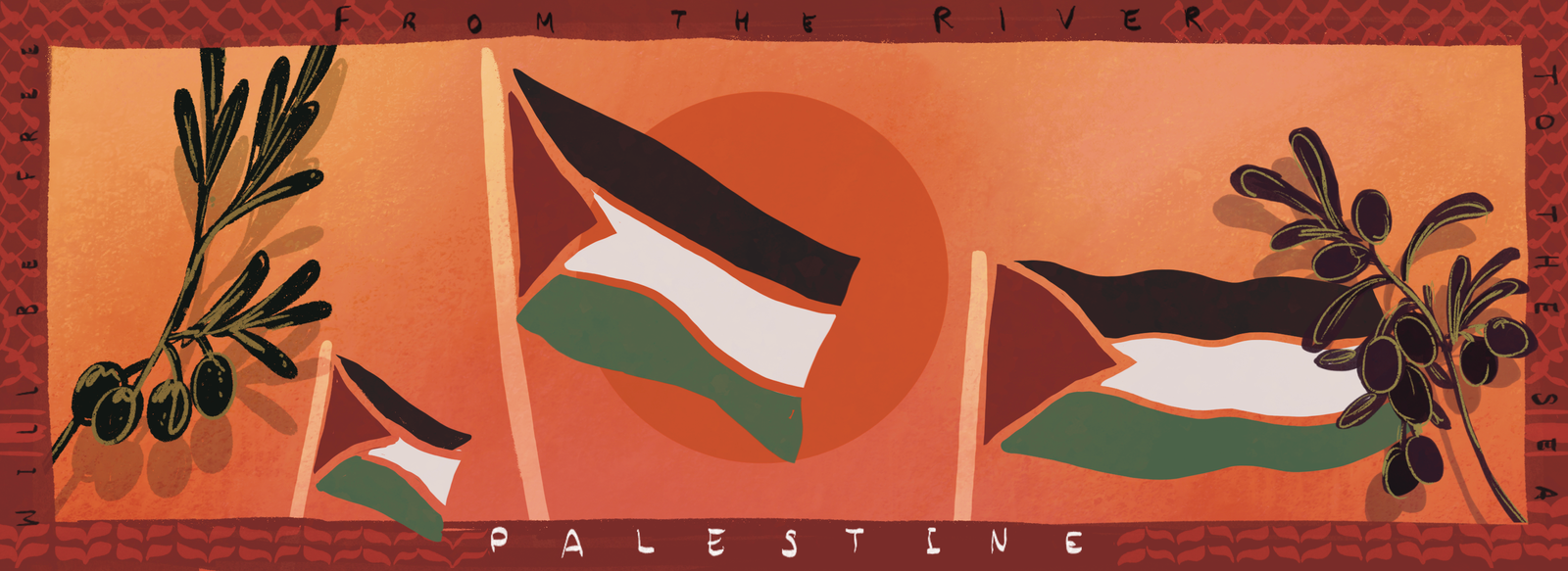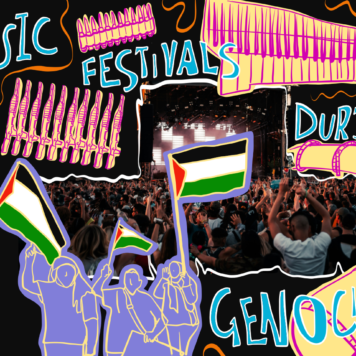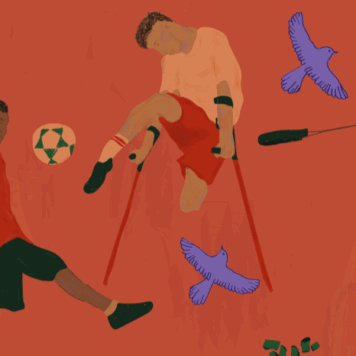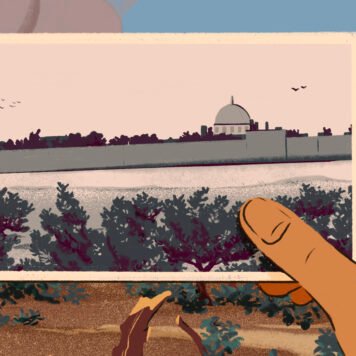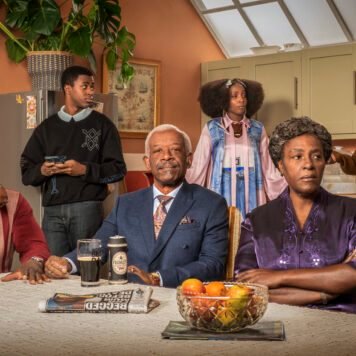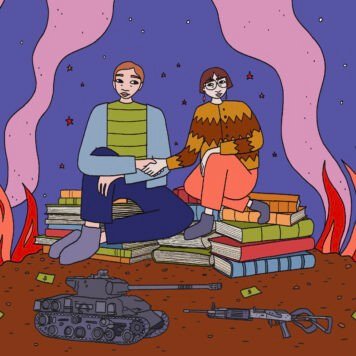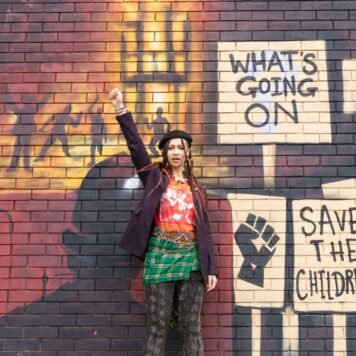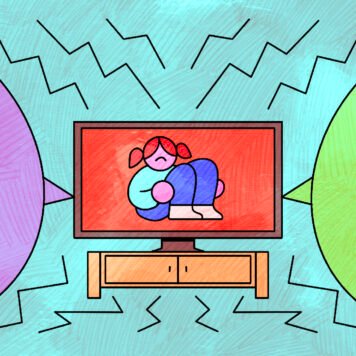As I write this, bombs have allegedly fallen silent in Gaza. In the four day ceasefire, no international journalists will be allowed into Gaza, so it is through the daring efforts of the remaining Palestinian journalists in the region that the truth of this will come to light.
Amid delays to the truce taking effect, on Thursday 23rd November Israel bombed 300 targets. The following morning, the Israeli Offense Forces blew up multiple sections of al-Shifa and arrested the director of the hospital as they withdrew.
The Israeli Defence Minister has stated he “expects” at least a further two months of a ground offensive following this four-day pause, while the Biden administration has focused on the raw materials up for grabs in the gas reserves off the Gazan coast.
In any case, the relentless ethnic cleansing of Palestinians in the West Bank and Occupied Territories continues – indeed, it has only accelerated in the past 75 years of the ongoing Nakba.
Concerningly, the continuation of incursions into the Northern border with Lebanon – which saw three journalists killed last week – promise only the expansion of Zionist violence.
40 Israeli hostages have been released as I write, as have 39 Palestinians from detention in Israel (a mere fraction of the thousands of Palestinians currently held in Israeli prisons). There is even uneasy talk of extending the truce by a few days. But as Israeli media calls to expand the offensive to other parts of the region, it’s clear that the rhetoric of a “pause” falls far short of what should be signified by the oft-preceding term “humanitarian.”
The limits of a ceasefire
World leaders have stood silent in the face of unambiguous genocide, and there is no ‘normal’ now left to return to – not for Palestinians, and not for anyone who might have once looked to global institutions to intervene in genocide. International support for Palestine has relied heavily on the demand for a ceasefire and the “humanitarian” lens, for obvious reasons: the uneasy truce and the ongoing violences it obscures underscore the need for a transition from the limited demand of a ceasefire to the more explicit and political demand of full decolonisation.
The temporary cessation of one front of colonial expansion does not challenge the ongoing settler-colonial project of Apartheid Israel. In fact, it can be used to frame the curfews in the West Bank, the settler violence in Hebron, the near-daily raids in Jenin, the fire-bombing of Sheikh Jarrah, the repeated storming of al-Aqsa and a thousand other violences, appropriations, displacements, as a reasonable compromise in return for pausing the genocide in Gaza.
To accept that Apartheid Israel is meaningfully liable to pressure on humanitarian grounds alone carries with it the danger of ignoring the inhumanity practised tacitly and explicitly, through bureaucracy and through bullets, by the state and by its vigilantes, that has for 75 years formed the basis of its approach to peace.
In other words, a pause from the genocide in Gaza has been secured after extraordinary mobilisations across the world focused on the humanitarian crisis Apartheid Israel has created: the ethnic cleansing has never paused, and no such appeals to humanity have managed to bring it to heel in the last century. By the date of publication of this piece, the pause in Gaza will be nearing its end, and dozens more Palestinians will have been killed in the West Bank.
Solidarity-building before the truce
In Britain, since 7th October, the Palestine solidarity movement has reached unprecedented levels of activity. In response to calls from Palestinian trade unions for a transnational day of action on the 10th November targeting infrastructure that enables Israeli war crimes, a series of actions culminated in the largest protest for Palestine in British history on 11th November.
The scale and breadth of these actions shouldn’t be underestimated.
Hundreds of university students across the country staged walk-outs and die-ins, some even occupying university buildings in protest at links to Israeli apartheid. At the University of Nottingham, a student occupation over the university’s complicity in the arms trade and links to BAE Systems is even now ongoing.
In Bristol, hundreds of young people walked out of school, leading a demonstration to deliver a petition to the Town Hall and calling on their elected representatives to demand a ceasefire: they have since announced that they will strike every Friday until a ceasefire is in place, and were joined last week by hundreds of kids in Tower Hamlets, Brighton, Manchester, Luton and Redbridge. Hundreds of children who last year experienced the effects of the largest strike wave in decades have now learnt that they, too, can take strike action.
Jewish groups like Na’amod have held protests and vigils, rejecting the violence committed in their names. In London, Manchester and Liverpool, major train stations have repeatedly been occupied by hundreds of protesters demanding an end to the genocide. The prominent visibility of pro-Palestinian Jewish groups and networks has gone some way to countering the right’s argument that anti-zionism necessarily equals anti-Semitism.
Direct action group Palestine Action have accelerated their long-standing targeting of arms manufacturers, with Elbit Systems’ Leicester and Shenstone sites and the Leonardo arms factory in Southampton among those hit by actionists halting the production of parts being used in the genocide of Palestinians.
Workers for a Free Palestine – a new network of rank-and-file trade unionists and workers – launched at the end of October by blockading Elbit Systems’ subsidiary Instro Precisions in Sandwich, Kent. On 10th November, it brought 400 workers to Rochdale to surround and shut down BAE Systems, at the same time as activists in Manchester launched a campaign against Fisher German – the property manager of Elbit subsidiary UAV Tactical Systems’ site in Shenstone – with an occupation followed by demos and phone blockades. Youth Front for Palestine have called a public demo outside Fisher German offices on 29th November, the International Day of Solidarity with the Palestinian People (the 76th anniversary of the UN’s adoption of the Partition Resolution).
All three groups have pledged to continue actions to halt British complicity in Israeli apartheid.
Just before this piece was due to go live on Monday 27th November, community union Acorn shut down the entrance to Meggit – a manufacturing company whose role in the production of Israel’s Apache attack helicopters was revealed by the Guardian in 2006 – in Birmingham, Leonardo in Bristol and the offices of BAE Systems in Leeds. Linking the fight against dispossession for those at risk of homelessness in Britain to the fight against the dispossession of the people of Gaza, the prospect of a community union with members across 25 cities with experience of direct action escalating their involvement in solidarity actions for Palestine is a serious one.
Global mobilisations
These actions in Britain have taken place in the context of – and in dialogue with – an escalation of actions across the globe. In the face of government complicity, massive levels of mobilising have exposed “ordinary” members of the public to state and police violence, sometimes for the first time. The effects of current mobilisations on domestic leftist movements in the West is both hard to overstate and difficult to analyse accurately in the current moment, but it seems clear that at the very least, there is the potential for the recomposition of these domestic leftist movements as a result of a renewed mass participation in internationalist politics.
Subscribe to shado's weekly newsletter
Exclusive event news, job and creative opportunities, first access to tickets and – just in case you missed them – our picks of the week, from inside shado and out.

In Britain, as elsewhere, it remains to be seen to what extent white-dominated activist and trade union networks are able to counter their own distance from the communities that have taken to the streets in their hundreds of thousands over the last six weeks. There is good cause to view the political affiliations developing across borders – as people see their own state’s repression mirrored, met with the same defiance, across the globe – as reinvigorating frayed traditions of internationalism that will have ramifications far beyond Palestine. Across the world, there are glimmers of hope that point to a reclamation of political agency, away from the electoral spectacle, in which the much-agonised-over binary of “public” and “activist” appears to be breaking down.
In Genoa, Italy, hundreds of workers blockaded the port to prevent the transport of weapons through the Israeli shipping company ZIM on the 10th November, following the previous day’s student occupations of universities in Rome, Padua and Naples. The same day, trade unionists filled the shore at the Port of Botany in Sydney, Australia, while activists on jet-skis prevented the docking of another ZIM ship. Dockworkers in Barcelona and trade unionists in Belgium also pledged to prevent the shipments of weapons to Israel.
Also on the 10th, in Canada, Indigenous activists and trade unionists joined forces to blockade arms factories in Hamilton, Toronto, Ottawa and Montreal. Across the USA, bridges and major highways have been shut down, banks that invest in Israeli arms companies have been vandalised and weapons manufacturers and ZIM ships have been prevented from docking or leaving with their cargo by the Palestinian Youth Movement, by autonomous activists and by the newly-launched Palestine Action US.
On 11th November, over 800,000 people marched through central London demanding a ceasefire and an end to the Occupation. Despite all of this – and ignoring the cries from the 10,000-strong demonstrators in Westminster – on 15th November, Parliament voted down an amendment brought by the Scottish National Party (SNP) calling for a ceasefire in Gaza. Since then, the offices of MPs who failed to support calls for a ceasefire, including opposition leader Keir Starmer, have been hit with demonstrations by constituents demanding their resignations. In one fell swoop, the mother of Parliaments has sown the seeds for the development of an anti-state politics at scale.
Material solidarity
Long before Parliament’s failure to pass the SNP amendment, it has been clear that while we can and should accelerate the pressure on our elected officials to resist the genocide of Gaza and the ethnic cleansing of the Palestinians across the occupied territories, that is not, in itself enough.
Even in the unlikely event that the British government had called for a ceasefire on 15th November, the material bases for Zionist violence would have remained embedded through production and supply chains, propaganda and finance capital in Britain as elsewhere.
The UK’s complicity in Israeli apartheid goes much deeper than our government’s enabling of genocide today. The companies lining our high streets; the headquarters of arms dealers; the offices of venture capital firms that manage wealth funds implicated in Israeli investments; the factories producing parts of surveillance and military supplies; the landlords that own the land on which these factories are built; the trucks, ships, docks and military bases through which those supplies are transported; the newspapers that churn out Zionist propaganda to manufacture consent for settler-colonialism.
Our complicity in Israeli apartheid is material, and so too must our solidarity be. Alongside mass marches, Boycott Divest Sanctions (BDS) movements and civil disobedience, a key tool in our arsenal is direct action.
Direct action
The distinction between direct action and civil disobedience as tactics is largely one of focus.
The primary objective of civil disobedience is to exert pressure on, for example, the government, to take a particular course of action (such as calling for a ceasefire or proposing an arms embargo on Israel).
The primary objective of direct action is the disruption of that which is being resisted – the functioning of factories producing weapons, of docks loading surveillance supplies, of landlords enabling arms manufacturers to operate on their land.
This disruption in many cases has the effect of exerting pressure on actors (governments, companies, politicians), of generating media coverage that can contribute to counter-propaganda and public opinion, of symbolic flash points of solidarity and of making interventions in movement ecologies. The disruption itself remains the primary objective, however, despite the fact that such disruption is a means to an end rather than (necessarily) an end in itself. Taj Ali chronicled some historic examples of actions like this in Tribune last month.
As Workers for a Free Palestine put it: “direct action like blockades serve to disrupt the Israeli war machine, whilst workplace organising builds collective power and leverage that can disrupt British complicity. We are doing both of these things.”
Internationalist solidarity
Their combination of encouraging trade unionists to take direct action and leading actionists towards the workers movement aims to revitalise the long-standing tradition of internationalist solidarity through organised labour. This strategy has emerged separate from but parallel to higher-risk and more damaging actions that groups like Palestine Action have been coordinating for years.
The combination of more easily criminalised actions through which small bands of actionists can cause lasting damage and mass actions that disrupt without damaging sites has the potential to shift the focus of solidaristic work from the streets to active sites of British complicity.
When I asked Yasmin el-Souda of the Palestinian Youth Movement about the significance of direct action in Palestine solidarity organising, she emphasised the continuity between the mobilisations of previous years and contemporary organising drives. “In 2021, when the ethnic cleansing of families in Sheikh Jarrah ignited a popular uprising across historic Palestine, we saw a similar blockade of the Israeli ZIM ship carrying weapons destined for the Zionist entity, and it also coincided with the launch of Palestine Action.” And as solidarity actions are currently following the appeals from those on the ground in Gaza, Yasmin explains that two years ago, “similar calls were made by Palestinians [for the global community] to take up strike action and organise on campuses around the world.”
This time around, there is, quite intentionally, more synchronicity. As Yasmin explains, “these actions have become more globally coordinated between North America, Europe and Britain. We are also witnessing a mass transformation in millions of people’s consciousness around Palestinian liberation.”
And this consciousness must continue to steer our action. As Yasmin puts it, “after the bombs drop and the dust settles, we have a responsibility to continue taking action to ensure that cutting ties with Zionism – whether through disrupting the arms trade, ending institutional partnerships or personal consumer choices that refuse Israeli products – becomes the new norm.”
Organising sustainably
No one group can or should helm the constellation of networks working towards inhibiting the machinery of apartheid. Coordinated autonomous actions can disrupt the functioning of the arms supply chain at multiple pressure points simultaneously.
What is paramount is that local networks in areas around these potential targets are linked up with and resourced by external activists, so alongside mass flashpoints there is sustained pressure from the communities among which these instruments of ethnic cleansing are hidden.
If we are aiming to strengthen the solidarity between groups taking direct action in solidarity with Palestine, welfare and safeguarding processes must be the prerequisite of taking action.
We cannot encourage mass participation in action if we assume everyone can or should be willing to court arrest, imprisonment and criminalisation – those with dependents, insecure migration statuses, criminal records or those at greater risk of police violence (trans or racialised or disabled people, for example) in particular may face barriers to participating in direct action as a result of such assumptions. At the same time, we should not ourselves deny marginalised comrades their own agency in taking risks – our safeguarding must be responsive rather than uniform, reflecting the intersecting identities of those who make up our expanding movement.
The need for safety and a diversity of tactics
It is clear that we are in this struggle for the long haul. The potential mass imprisonment of activists and trade unionists represents a real strategic risk to the momentum and longevity of solidarity organising long-term.
We have to insist on the validity of a diversity of tactics and a continual diversification of the solidarity movement ecology and we must continue to lay the foundations for the next few decades of sustainable organising that cannot take for granted the willingness of people to be criminalised en masse.
This means refraining from the sectarianism that holds that there are “good” (peaceful) and “bad” (trouble-making) activists, or that dismisses huge swathes of the street mobilisations as “not radical enough.”
The more radical flanks must be in productive dialogue with lay members of community groups, offering resources and the potential for radicalisation, while being attentive to valid concerns and holding space for differing political tendencies. Equally, our demands must be both responsive to this particular moment and conscious of the reductive potential for Palestine solidarity work to be pigeon-holed as one rooted in humanitarianism rather than an anti-colonial politics.
It is natural that activist comms in Britain have largely focused around demands for a ceasefire. But if we want to maintain the mass appetite for organising beyond this current moment, it will require a reorientation towards ending British complicity in Israeli apartheid that precedes our government’s more overt support for genocide in recent times.
If the momentum of the mass marches over the last two months can be channelled into mass actions on all fronts, focused on disrupting the financial and material means by which Israel enacts settler-colonialism, we stand a chance of counteracting the gross injustices done in our names by the British state.
What can you do?
- Join Youth Front For Palestine outside Fisher German offices on the 29th November
- Follow Workers For a Free Palestine on x @workersforpal for information on how to get involved in future actions and, crucially, how you can financially support future actions.
- For organisers: Obtaining the informed consent of all potential participants in any action has to be sacrosanct. No actions should go ahead without arrestee support and court support pre-arranged and as much capacity must be directed towards the social reproductive work of feeding and caring for each other as is put towards mobilising people to protest, picket and blockade.
- Join a trade union and organise in your local branch – Workers in Palestine have some specific demands to organise around, and Organise Now! is a good resource for getting started as a new trade unionist.
- Check out the BDS list and organise a protest in your local area against a company on the list.
- Follow the Green and Black Cross and respond to calls for arrestee support when needed.
- Keep an eye out for Know Your Rights and Legal Observer trainings – if you have a local Copwatch group, joining is a good starting point.
- Talk and post about the need for full decolonisation, not just a ceasefire.
- Read the following articles:
